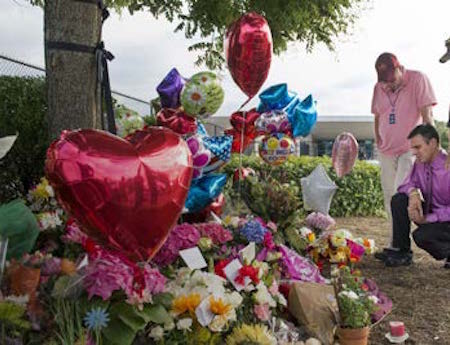Slain WDBJ Crew Saluted at RTDNF Dinner

The smarter way to stay on top of broadcasting and cable industry. Sign up below
You are now subscribed
Your newsletter sign-up was successful
The Radio-Television Digital News Foundation saluted Adam Ward and Alison Parker, the WDBJ Roanoke morning news team slain last August by a disgruntled former co-worker.
That tribute kicked off RTDNF's annual awards banquet in Washington Wednesday (March 16) and featured WDBJ President and General Manager Jeffrey Marks saying it had been a rocky road to recovery since the shootings. He thanked his audience for the tweets and notes and the packages. He also used the platform, to urge his audience to dig deeper and said one of the reasons he had been able to handle the tragedy and move not only forward, but up--to try an do better journalism, was 40 years of experience, saing there was no substitute for that experience..
Marks said journlims isn't about "he said, she said," but about uncovering what others want secret."
Referring to election coverage, he said: "It's the issues, folks, not the frigging horse race." That sentiment--sans the "friggin"--was echoed by Lifetime Achievement Award winner Tom Brokaw later in the evening.
Not surprisingly for a dais full of journalists getting awards from, and speaking to a roomful of, journalists while accepting them, the election, and specifically Donald Trump, was invoked both explicitly and implicitly.
Robert Garcia, executive producer of newscasts for National Public Radio and recipient of the First Amendment Service Award, suggested that one of the Free speech threats was a candidate trying to "open up" libel laws. Trump has vowed that, if elected, he would try to “open up” the libel laws so that journalists’ “hit pieces” could be discouraged.
And in introducing Brokaw, NBC News President Deborah Turness said the journalist piece she was most proud of during her tenure was Brokaw's commentary following Donald Trumps call for blocking Muslim's entry into this country (https://www.youtube.com/watch?v=DR4FRqJeKVA).
The smarter way to stay on top of broadcasting and cable industry. Sign up below
"Even in the season of extremes," said Brokaw in the piece, Trump's statement was "a dangerous proposal that overrides history, the law and the foundation of America itself." He then talked about the consequences of "paranoia overriding reason," cited Japanese internment camps, Nazi Germany, segregation, and Joseph McCarthy's anti-communist witch hunt.
Brokaw delivered the piece from Arlington Cemetery, beside the grave of an American soldier, Kareem Rashad Sultan Khan, a Muslim. "Mr. Trump cannot exclude him from America," said Brokaw. "He has a permanent home here in Section 60 at Arlington National Cemetery."
Turness used that as an example of why Brokaw was current, relevant, and was needed to "tell us things we may not want to hear."
Rich Boehne, president of the E.W. Scripps Co., who got the First Amendment Leadership Award, used his time to tell his audience that they were at part to blame for the atrophying of the muscles government officials should be using to produce documents. He said the decline of local, professional journalists had meant that those government officials had gotten out of practice in replying to public document requests and that news leadership was partly to blame.
Boehne said in many markets, the First Amendment and the public's right to know were out of sight and out of mind in newsrooms, statehouses and courthouses.
Jason Rezaian, the Washington Post Tehran correspondent imprisoned for 545 days until freed in a prisoner swap in January of this year, received the First Amendment Award. In one of his first public appearances since being released, he said he was "so happy to be here," then said it again as though savoring the thought.
He said the protections provided by the First Amendment separated the U.S. from other countries. "Trust me, I should know," he added
Cami McCormick, the CBS Radio correspondent who was injured in an IED explosion in Afghanistan in 2009, received the Leonard Zeidenberg award, which is named after the late B&C chief correspondent. She thanked her colleagues for their support during her rehabilitation, and brought along the surgeons who helped get her back on her feet and dubbed her "badass McCormick," and appellation she clearly relished.
University of Missouri photojournalist Tim Tai got a newly created First Amendment Defender Award for, among other things, asserting his right to photograph campus protestors.
Contributing editor John Eggerton has been an editor and/or writer on media regulation, legislation and policy for over four decades, including covering the FCC, FTC, Congress, the major media trade associations, and the federal courts. In addition to Multichannel News and Broadcasting + Cable, his work has appeared in Radio World, TV Technology, TV Fax, This Week in Consumer Electronics, Variety and the Encyclopedia Britannica.

